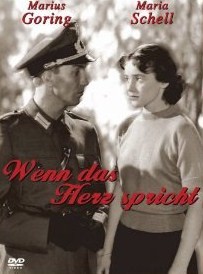
Kurt Julian Weill was a German-born American composer active from the 1920s in his native country, and in his later years in the United States. He was a leading composer for the stage who was best known for his fruitful collaborations with Bertolt Brecht. With Brecht, he developed productions such as his best-known work, The Threepenny Opera, which included the ballad "Mack the Knife". Weill held the ideal of writing music that served a socially useful purpose, Gebrauchsmusik. He also wrote several works for the concert hall and a number of works on Jewish themes. He became a United States citizen in 1943.

Maximilian Schell was a Swiss actor. He won the Academy Award for Best Actor for the 1961 American film Judgment at Nuremberg, his second acting role in Hollywood. Born in Austria, his parents were involved in the arts and he grew up surrounded by performance and literature. While he was still a child, his family fled to Switzerland in 1938 when Austria was annexed by Nazi Germany, and they settled in Zürich. After World War II ended, Schell took up acting and directing full-time. He appeared in numerous German films, often anti-war, before moving to Hollywood.
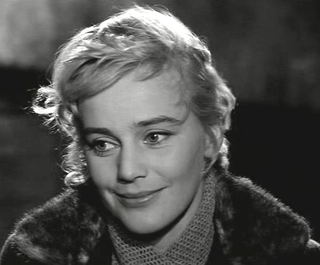
Maria Margarethe Anna Schell was an Austrian-Swiss actress. She was one of the leading stars of German cinema in the 1950s and 1960s. In 1954, she was awarded the Cannes Best Actress Award for her performance in Helmut Käutner's war drama The Last Bridge, and in 1956, she won the Volpi Cup for Best Actress at the Venice Film Festival for Gervaise.

Marius Re Goring was an English stage and screen actor. He is best remembered for the four films he made with Powell & Pressburger, particularly as Conductor 71 in A Matter of Life and Death and as Julian Craster in The Red Shoes. He is also known for playing the title role in the long-running TV drama series, The Expert. He regularly performed French and German roles, and was frequently cast in the latter because of his name, coupled with his red-gold hair and blue eyes. However, in a 1965 interview, he explained that he was not of German descent, stating that "Goring is a completely English name."

Love in Thoughts is a German film directed by Achim von Borries. It was released in Germany on February 12, 2004. The main characters are played by August Diehl, Daniel Brühl, Anna Maria Mühe and Jana Pallaske.
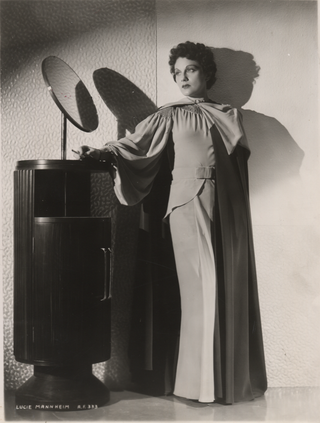
Lucie Mannheim was a German singer and actress.
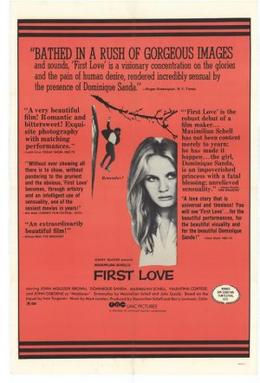
First Love is a 1970 film, written, directed, produced and starred in by Austrian director Maximilian Schell. It is an adaptation of Ivan Turgenev's 1860 novella of the same name, starring Schell, Dominique Sanda, and John Moulder-Brown.

The Man Who Watched Trains Go By (1952) is a crime drama film, based on the 1938 novel by Georges Simenon and directed by Harold French. It has an all-European cast, including Claude Rains in the lead role of Kees Popinga, who is infatuated with Michele Rozier. The film was released in the United States in 1953 under the title The Paris Express.

The Case of the Frightened Lady is a 1940 British, black-and-white, crime, drama, mystery thriller, directed by George King and starring Marius Goring as Lord Lebanon, Helen Haye as Lady Lebanon, Penelope Dudley Ward as Isla Crane, George Merritt (actor) as Detective Inspector Tanner, Ronald Shiner as Detective Sergeant Totty and Felix Aylmer as Dr Amersham. It was produced by Pennant Picture Productions and presented by British Lion Film Corporation. The film is based on the 1931 play by Edgar Wallace.

Beyond the Curtain is a 1960 British drama film written and directed by Compton Bennett, and starring Richard Greene and Eva Bartok.

The Expulsion is a 1923 silent German drama film directed by F. W. Murnau. The film is now considered to be lost. The film's sets were designed by the art directors Erich Czerwonski and Rochus Gliese. Location shooting took place in the Riesengebirge.

Blue Eyes of the Broken Doll is a 1973 Spanish horror-giallo film directed by Carlos Aured and starring Paul Naschy, Diana Lorys, Maria Perschy, and Eva Leon. The film was shown theatrically in Spain in August 1974 as Los Ojos Azules de la Muñeca Rota. It was released theatrically in the U.S. and on VHS Home Video as The House Of Psychotic Women, and was shown on U.S. late-night television as House of Doom. The film was shown in Belgium as Mystery of the Blue Eyes. Most prints are missing a brief scene where a pig is slaughtered on a farm. Today the film is readily available complete and unedited on DVD as The Blue Eyes of the Broken Doll.
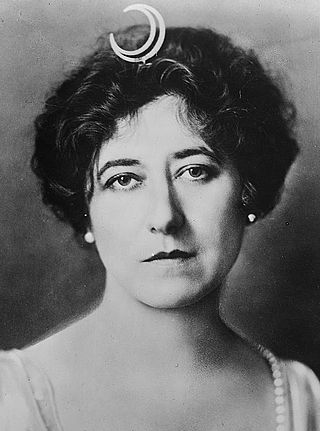
Gabrielle Dorziat was a French stage and film actress. Dorziat was a fashion trend setter in Paris and helped popularize the designs of Coco Chanel. The Théâtre Gabrielle-Dorziat in Épernay, France is named for her.
Ruth Stephan was a German film and stage actress. She appeared with Heinz Erhardt in the 'Willi' series of films.

Wibbel the Tailor is a 1939 German historical comedy film directed by Viktor de Kowa and starring Erich Ponto, Fita Benkhoff and Irene von Meyendorff. It is an adaptation of the 1913 play Wibbel the Tailor by Hans Müller-Schlösser. It is set in Düsseldorf during its occupation by French troops during the Napoleonic Wars (1803-1815).

Nights on the Road is a 1952 West German crime drama film directed by Rudolf Jugert and starring Hans Albers, Hildegard Knef, Marius Goring and Lucie Mannheim. It was produced by the veteran Erich Pommer who had returned to Germany after years of exile. It is one of the more prominent German film noirs. It was acclaimed by German critics on its release and was awarded a prize at the Berlin Film Festival. It was shot at the Bavaria Studios in Munich and on location in Frankfurt and various autobahns. The film's sets were designed by Rudolf Pfenninger and Ludwig Reiber. The production budget was around 900,000 deutschmarks.

The Girl from Flanders is a 1956 romantic drama film directed by Helmut Käutner starring Nicole Berger, Maximilian Schell, and Viktor de Kowa. It is an adaption of the novel Engele von Löwen written by Carl Zuckmayer.
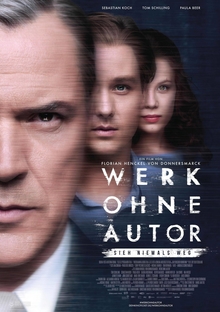
Never Look Away is a 2018 German epic coming-of-age romantic drama film written and directed by Florian Henckel von Donnersmarck. It was nominated for a Golden Lion at the 75th Venice International Film Festival and for a Golden Globe by the Hollywood Foreign Press Association. It was nominated for two Academy Awards at the 91st Academy Awards, in the Best Foreign Language Film and Best Cinematography categories. This was only the second time that a German-language film by a German director was nominated for an Oscar in multiple categories, the other film being Wolfgang Petersen's Das Boot 36 years previously.
Isa and Jutta Günther are German twin former actresses.
